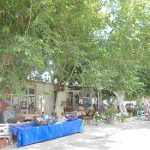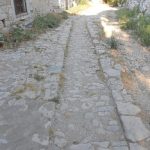“I just turned the egg seller away. I sent him away last week too. He looked so shocked. Everyone else is doing the same thing. He brings a whole truck over from Yalova. What is he going to do with all those eggs?”
This is not a piece about the rights and wrongs of the Gezi Park protests or the horrific police response to them. Nor yet is it a piece full of statistics about airport arrivals and hotel occupancy levels. Instead it is a personal piece about the reality of what all this has meant for Sultanahmet, the heart of the İstanbul tourism industry at the peak of the tourist season, as I have witnessed it.
A few days ago it was reported that the İstanbul Directorate-General of the Ministry of Tourism and Culture had announced that the high-profile problems of the last two months had had “no repercussions on the (tourism) sector.” Clearly no representative of that organisation had set foot in Sultanahmet recently then.
I am staying in a hotel near the Four Seasons Sultanahmet. I’ve been staying here for the last twenty years during which time I’ve watched all the houses in the street metamorphose into hotels. Last summer they were all heaving with visitors and no room was to be had at this time of year for love or money. This year? Whoever I ask, the response is always the same – a slightly sheepish shrug, a wobble of the hand up and down that indicates “so-so”, followed by a gush of honesty in which it becomes plain that it’s the lucky few that can rustle up even 30% occupancy this year.
This has repercussions all down the line because while trickle-down economics may have failed miserably when it comes to bringing enrichment for all, trickle-down loss of business is very effective in creating disaster all along the line. Not usually the cheeriest of souls, my hotelier’s response to the catastrophe has been to try and laugh it off.
“Any more people checked in?” I asked him yesterday morning.
“No, but there’s this list of bills to be paid,” he laughed as he waved a piece of paper with figures running down it at me.
This is a medium-sized hotel, which means that it employs three receptionists and a team of four or five bed- and breakfast-makers. How, I wonder, are they to be paid with no customers? “He could give them a month off,” a friend suggested. Yes, and then how are they to pay their rent?
In the Arasta Bazaar beside the Blue Mosque it’s quiet. In the Kapalı Çarşı (Grand Bazaar) it’s quiet. In a Gülhane carpet-shop it’s quiet, and I assume that it’s the same over in Taksim, home to most of the four and five-star hotels. It was, after all, some of the big-name hotels – The Marmara, the Divan, the Hilton – that found themselves unexpectedly caught up in the troubles as protestors rushed to take refuge in them while the police rushed after them firing tear gas. Certainly there were times this week when erstwhile ever-crowded İstiklal Caddesi was eerily, upsettingly empty. Even the number of cruise ships blocking the view from the İstanbul Modern is conspicuously reduced.
This is the second time that I’ve witnessed a disaster like this in Turkey. The first time was in 1999 when, after the capture of their leader, Abdullah Öcalan, the PKK (Kurdistan Worker’s Party) issued threats against tourists leading to massed cancellations. Then I was in Cappadocia and then I saw for the first time how it is possible for a face to turn white beneath a sun tan as a friend waved a faxed list of cancellations and whispered: “We employ forty people. They all have families. What are we going to do?” I saw that same ashen look on faces again this week. It’s not a nice look.
Because the sad truth is that in marketing terms tourism is a discretionary product, the sort of product that is interchangeable with upgrading your television or buying a new computer. It’s of little use people wailing that Sultanahmet is perfectly safe and was never affected by the gas or the water cannons because the reality is that no one has to book a holiday, and certainly no one has to book a holiday to anywhere where they are in the slightest doubt about their safety or comfort. Ask the Northern Ireland tourist board about tourism to the province during the height of the IRA bombing campaign. The bombs might have been going off in Belfast but there were no tourists on the coast of Antrim either. And look at the results of the same IRA bombs in England. Each one led to a rush of holiday cancellations, particularly from the Americans, and not just in London.
Arrivals may be holding up well all along the coast but that will be in part because most of the sun-and-sand holidaymakers still book packages which they can only cancel without losing their money if, in the case of the British, the government has issued a warning against travel to Turkey. That hasn’t happened which means that those who do opt to stay home will be left out of pocket. Most, then, will continue with their original plans. İstanbul, on the other hand, receives a high percentage of independent travellers, many of them late bookers, who may well be able to cancel without much loss.
The one bright spark in all this is that statistics suggest that the period following an incident during which no new bookings arrive is getting shorter as people become more accustomed to the idea of the world as a risky place. That being so, provided there are no further flare-ups of trouble here it could be that business will pick up again in September and October allowing people to recoup some of their losses.
It’s a situation devoutly to be hoped for. If not, the poor egg sellers of Yalova will be in serious trouble.
Written: 18 July 2013


